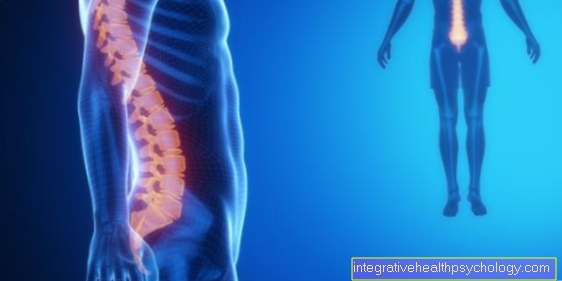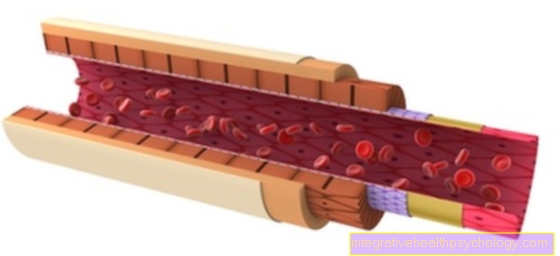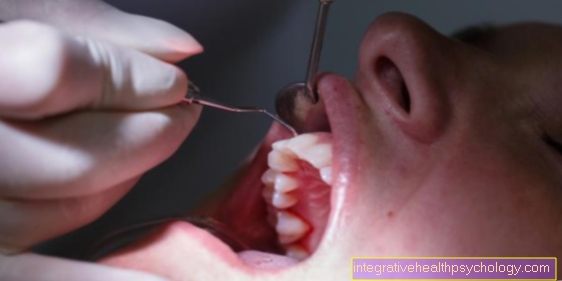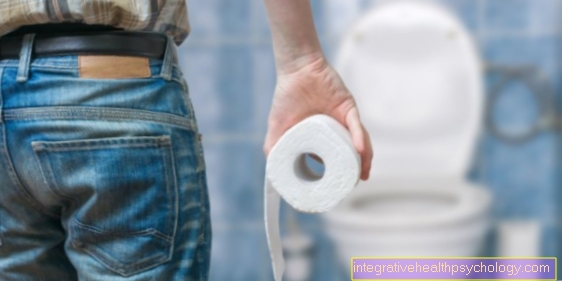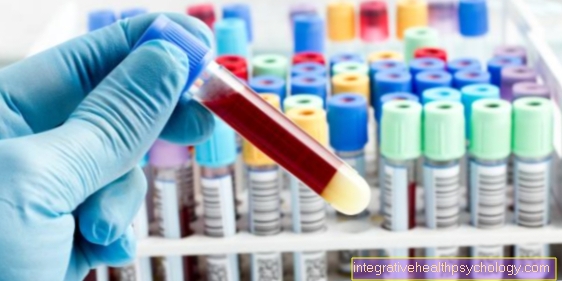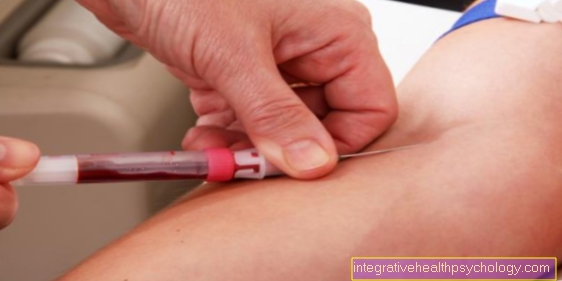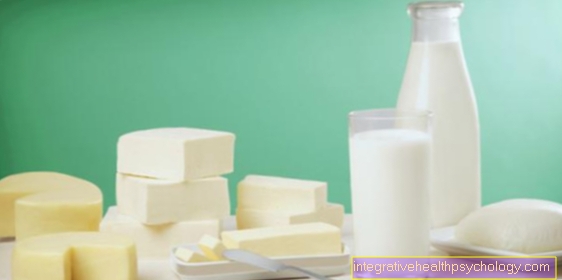Defecation after biliary surgery
introduction
The gallbladder stores and concentrates the bile that is formed in the liver. If food reaches the duodenum through the stomach, the bile juices are reflexively directed from the gallbladder into the intestine and mixed with the chyme.
The digestive enzymes it contains, especially lipases, are responsible for digesting fat. If the gallbladder is surgically removed, the bile is transported directly from the liver to the intestine without being stored and concentrated beforehand. In normal cases, fat digestion continues as usual.
Over time, the executing bile ducts can expand somewhat and thus take over the storage function of the gallbladder.
Digestion is usually not restricted after a gallbladder removal.
Read more: Gallbladder

This is how the stool changes after biliary surgery
Constipation may develop for a few days immediately after the operation. Until the digestion gets going again, make sure you drink enough fluids and exercise lightly.
If necessary, light laxatives can be taken after consulting a doctor.
Other patients may experience diarrhea after the operation (postcholecystectomy syndrome), one possible cause being the uncontrolled release of bile fluid / enzymes.
Normally, bile acids are reabsorbed (taken from the intestines into the body) and reused in deeper sections of the small intestine. If too much bile is released, bile acids enter the large intestine. This irritates the intestinal mucous membrane, which can lead to severe diarrhea (chologene diarrhea).
A colestyramine powder can provide relief here.
In contrast, there may also be a lack of bile fluid. A lower amount of fat digestive enzymes means that fat is transported undigested through the intestines.
Fat makes the stool soft and voluminous; foul-smelling stools (steatorrhea) can develop. Artichoke supplements can be taken for therapy.
In addition to the consistency, the color of the stool can also change after a gallbladder removal. The stool is usually brown in color, but changes in the emptying of the bile can cause the stool to be yellow in color. If there is active bleeding, especially in the upper digestive tract, the stool turns black. A black color represents an emergency and a doctor must be consulted urgently.
Read more on this topic: Colors of bowel movements
Yellow bowel movements
Usually the stool is brown in color. The color is created by degraded bile pigments e.g. Bilirubin (yellow), which is later converted to stercobilin (brown). If the intestinal transit is accelerated, as is the case with diarrhea, less stercobilin is produced and the stool becomes lighter / yellowish.
Another cause of yellow bowel movements is a biliary disorder. If the bile cannot drain away, bile congestion occurs. The bile pigment bilirubin is excreted less and is deposited in the body, the stool becomes increasingly lighter.
In addition, the urine turns dark and the skin and eyes yellow.
Bile congestion can occur after removal of the gallbladder due to adhesions or narrowing of the draining biliary tract from the liver. In addition, gallstones can form again in the bile ducts of the liver, which also hinders the flow of bile.
Black bowel movements
The longer the food is in the intestine, the darker the color of the stool. However, if the faeces are really black, a doctor must be consulted.
The black color occurs when blood comes into contact with stomach acid. There is therefore a strong suspicion of upper gastrointestinal bleeding (bleeding in the upper digestive tract).
Bleeding can occur e.g. caused by a stomach ulcer or as a complication of surgery on the stomach or surrounding structures such as the gallbladder. Large amounts of blood can be lost through the gastrointestinal tract, leading to life-threatening anemia.
You might also be interested in: Black bowel movements
Causes of change
The causes of the changes are not always clear.
Constipation or diarrhea can have psychological as well as organic causes. After an operation, digestive problems can arise due to pain or exacerbate existing problems. Good pain therapy is therefore very important.
However, pain relievers, such as opiates, given during and after surgery can also cause constipation. An individual dosage must therefore be selected and substances that increase bowel movement may be administered.
People can usually live well without a gallbladder, but in some cases there are problems (inhibition or increase) in the release of bile, which can lead to diarrhea. In addition, the stool can turn yellow due to a lack of bile pigments or undigested fat. Active bleeding causes the stool to turn black, which is an emergency that must be clarified.
Hard bowel movements
After an operation, especially in the abdomen, the intestinal tract often needs some time to get going again. In particular, pain relievers, such as opiates, that are given during surgery, inhibit bowel movement.
Water is withdrawn from the food pulp on its way through the intestine. The longer the intestinal passage, the harder the stool becomes. Drinking fluids or taking foods or drugs that increase bowel movement can reduce constipation. Surgical manipulation can also limit the movement of the bowel for a short time or for a long time due to scarring or twisting.
If the problems persist in the long term, the cause must be clarified, as in the worst case there is a risk of an intestinal obstruction.
What can I do to stimulate my bowel movements after biliary surgery?
First of all, you should drink enough fluids (2-3 liters of water per day) to make the stool softer. In addition, slight movement, e.g. in the form of walks to stimulate digestion. You can also stimulate digestion with the help of dietary fiber, which swells up in the intestine. The increased volume stimulates the intestinal muscles and improves peristalsis (bowel movement).
High-fiber foods are e.g. cooked vegetables, peas, lentils or flax seeds. Herbs such as coriander, anise, fennel or caraway, especially in the form of warm drinks, also work wonders. For the first 2-3 weeks after a gallbladder removal, you should avoid flatulence, high-fat and difficult to digest foods such as onions, cabbage, legumes, beans, yeast, raw vegetables, coffee and sugary drinks.
If necessary, mild laxatives can also be used (e.g. lactulose). If constipation persists, you should consult a doctor.
More on this topic: Stimulate bowel movements
Duration of changes in stool after biliary surgery
The digestion is normally regulated in the first 2-3 days after the operation. Patients do not usually need to follow a special diet.
In the first 2-3 weeks, you should avoid flatulent and difficult to digest foods. Occasionally, constipation or diarrhea last a little longer, especially if the affected person has previously struggled with digestive problems.
Problems that last longer than a month, the appearance of black stools or the complete absence of bowel movements for a week should see a doctor.








